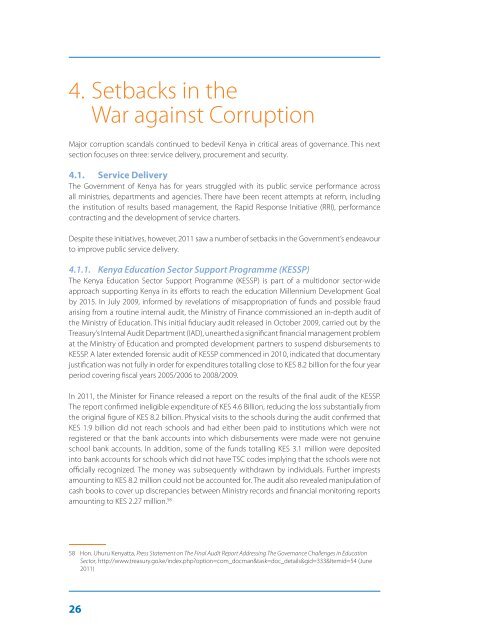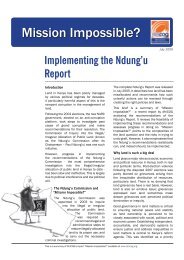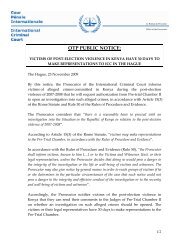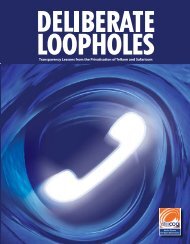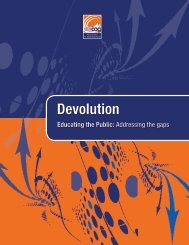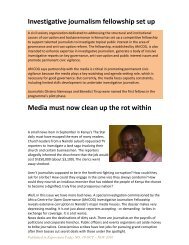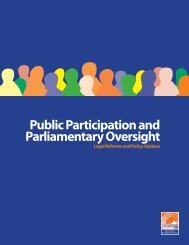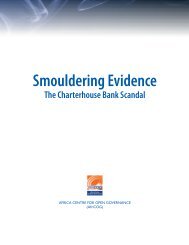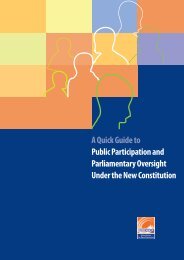Untitled - Africa Centre for Open Governance
Untitled - Africa Centre for Open Governance
Untitled - Africa Centre for Open Governance
You also want an ePaper? Increase the reach of your titles
YUMPU automatically turns print PDFs into web optimized ePapers that Google loves.
4. Setbacks in the<br />
War against Corruption<br />
Major corruption scandals continued to bedevil Kenya in critical areas of governance. This next<br />
section focuses on three: service delivery, procurement and security.<br />
4.1. Service Delivery<br />
The Government of Kenya has <strong>for</strong> years struggled with its public service per<strong>for</strong>mance across<br />
all ministries, departments and agencies. There have been recent attempts at re<strong>for</strong>m, including<br />
the institution of results based management, the Rapid Response Initiative (RRI), per<strong>for</strong>mance<br />
contracting and the development of service charters.<br />
Despite these initiatives, however, 2011 saw a number of setbacks in the Government’s endeavour<br />
to improve public service delivery.<br />
4.1.1. Kenya Education Sector Support Programme (KESSP)<br />
The Kenya Education Sector Support Programme (KESSP) is part of a multidonor sector-wide<br />
approach supporting Kenya in its ef<strong>for</strong>ts to reach the education Millennium Development Goal<br />
by 2015. In July 2009, in<strong>for</strong>med by revelations of misappropriation of funds and possible fraud<br />
arising from a routine internal audit, the Ministry of Finance commissioned an in-depth audit of<br />
the Ministry of Education. This initial fiduciary audit released in October 2009, carried out by the<br />
Treasury’s Internal Audit Department (IAD), unearthed a significant financial management problem<br />
at the Ministry of Education and prompted development partners to suspend disbursements to<br />
KESSP. A later extended <strong>for</strong>ensic audit of KESSP commenced in 2010, indicated that documentary<br />
justification was not fully in order <strong>for</strong> expenditures totalling close to KES 8.2 billion <strong>for</strong> the four year<br />
period covering fiscal years 2005/2006 to 2008/2009.<br />
In 2011, the Minister <strong>for</strong> Finance released a report on the results of the final audit of the KESSP.<br />
The report confirmed ineligible expenditure of KES 4.6 Billion, reducing the loss substantially from<br />
the original figure of KES 8.2 billion. Physical visits to the schools during the audit confirmed that<br />
KES 1.9 billion did not reach schools and had either been paid to institutions which were not<br />
registered or that the bank accounts into which disbursements were made were not genuine<br />
school bank accounts. In addition, some of the funds totalling KES 3.1 million were deposited<br />
into bank accounts <strong>for</strong> schools which did not have TSC codes implying that the schools were not<br />
officially recognized. The money was subsequently withdrawn by individuals. Further imprests<br />
amounting to KES 8.2 million could not be accounted <strong>for</strong>. The audit also revealed manipulation of<br />
cash books to cover up discrepancies between Ministry records and financial monitoring reports<br />
amounting to KES 2.27 million. 58<br />
58 Hon. Uhuru Kenyatta, Press Statement on The Final Audit Report Addressing The <strong>Governance</strong> Challenges in Education<br />
Sector, http://www.treasury.go.ke/index.phpoption=com_docman&task=doc_details&gid=333&Itemid=54 (June<br />
2011)<br />
26


